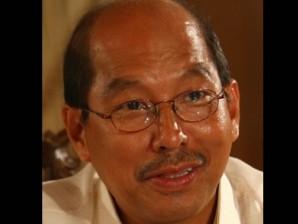Palace confident of sin tax bill approval

As the bill goes into debate in the Senate, Budget Secretary Florencio Abad expressed confidence that both chambers of Congress would reconcile their versions and pass the bill before the end of the year. INQUIRER FILE PHOTO
Malacañang is confident that the Senate will approve by Nov. 19 the sin tax bill that would generate a minimum P40 billion in revenue and that Congress will pass a reconciled version before the end of the year.
With most senators agreeing in principle with the version and a broad sector of the public supporting it, the passage of the key administration measure would be a cinch, without President Aquino marshaling his allies to approve it, Cabinet officials said on Sunday.
“They have agreed on the minimum P40 billion. Nobody raised an issue against it,” Secretary Manuel Mamba of the Presidential Legislative Liaison Office said by phone, recalling the Oct. 17 caucus between Cabinet officials and senators in the Senate. “I presume the agreement stands.”
In that caucus, Finance Secretary Cesar Purisima, Health Secretary Enrique Ona and Revenue Commissioner Kim Henares told the senators that the measure should generate from P40 billion to P60 billion to have an impact on the population.
A version reported out by Sen. Ralph Recto fell short of the administration’s target. Recto later quit as chair of the ways and means committee after coming under fire from Cabinet officials.
Article continues after this advertisementPublic pressure
Article continues after this advertisement“The President has a very clear stand on this. P40 billion is OK, but P60 billion is better,” Mamba said when asked whether there was a need for the President to marshal his allies to approve the bill.
“If they want to go against that bill, they will go against public pressure. That’s public sentiment,” he added.
The Senate is racing against time to pass the measure, with Sen. Franklin Drilon last week reminding his colleagues that they have until Nov. 19 to approve it.
Most of the senators have asked for more time to study the measure before interpellating Drilon, acting chair of the ways and means committee.
If his version is approved, Drilon said P46 billion in additional revenue would be generated from the sin taxes. If this is added to the P48 billion in sin taxes collected in 2011, total collection for the first year would be P94 billion.
Reconciled bills
As the bill goes into debate in the Senate, Budget Secretary Florencio Abad expressed confidence that both chambers of Congress would reconcile their versions and pass the bill before the end of the year.
“If you were to base it on the strength of argumentation, especially from the superior positive public health and revenue contribution of the measure, broad support from the general public and majority support from both chambers of Congress, we are confident that a sin tax reform law can pass before the year-end,” Abad said in a text message.
But the challenge would come from industry players and lawmakers “who represent their constituencies where their businesses are located or which depend on the industry for livelihood and employment, like the tobacco-growing provinces,” he added.
Real issue
Abad said the real issue was determining the degree by which the measure could be made into a substantial reform measure, both as public health intervention, as well as a revenue reform measure.
This point of contention could prolong debates and negotiations but “it seems the stakeholders are open to listen and arrive at some acceptable compromise,” he said.
Communication Secretary Ricky Carandang outlined the urgency of approving the measure: “It’s very important that a sin tax bill in the Abaya-Drilon mold be passed at the soonest possible time in order for us to expand health care service for the poor.”
Joseph E.A. Abaya is the former chair of the House ways and means committee. He is now the energy secretary.
“We are doing what we can to make this happen,” Carandang said.
To better reconcile their versions on the bicameral conference committee, Mamba proposed that the House lawmakers tweak their own measure to match Drilon’s substitute.
“The House version pegs the revenues from tobacco at P26 billion. The revenue from liquor is low. To make it P40 billion to P45 billion, they should adjust the taxes on fermented spirits and distilled liquor,” he said.
The House bill seeks P33 billion in additional annual revenue.